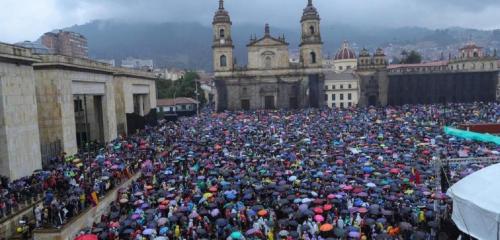Latin America, epicenter of global political struggles in the 21st century
The third decade will be one of tough dispute on a global scale, with the uncontrollable rise of China, in its alliance with Russia.
- Análisis

After having played a leading role in some of the most important historical phenomena of the 20th century, Latin America has suffered a harsh offensive from global capitalism in the last decades of the past century. The debt crisis closed what was, until then, the longest growth cycle of our economies, which began in the 1930s. Military dictatorships in some of the continent's most politically important countries – Brazil, Uruguay, Chile, Argentina –dealt a harsh blow to the democracies and popular forces in those countries. Latin America has been the continent with the largest number of neoliberal governments and in their most radical forms.
It is in reaction to all this that Latin America has projected itself as the only region in the world that has had anti-neoliberal governments, – in Brazil, Argentina, Uruguay, Venezuela, Bolivia, Ecuador – inter-coordinated in processes of regional integration. They have been the only governments in the world that have reduced inequalities, social exclusion, hunger, destitution and poverty, contrary to global trends.
Latin America has projected not only an efficient model for combating and overcoming neoliberalism, with economic development and income distribution, but also the great leaders of the left on a global scale: Lula, Néstor and Cristina Kirchner, Hugo Chávez, Pepe Mujica, Evo Morales, Rafael Correa, López Obrador. The left of the 21st century is anti-neoliberal and has its epicenter in Latin America.
Even after the right, coordinated internationally, has resumed the offensive, defeating progressive governments in countries such as Argentina, Brazil, Ecuador and Uruguay, the dispute continues, staged between neoliberal and anti-neo-liberal forces, democratic and anti-democratic ones, those of national sovereignty and those subordinated to the United States.
Argentina has demonstrated the capacity to resist the devastating policies of the neoliberal government of Mauricio Macri, defeated it and resumed the path of economic, social, political and cultural reconstruction of the country. Mexico is moving forward on the path to surpassing so many disruptive neoliberal governments.
In Brazil, after the monstrous operation that removed Dilma Rousseff from government and condemned Lula, both without evidence, and has chosen, by totally illegal manipulation mechanisms, a shameful government, the opposition is reorganizing and reappearing as an alternative. Lula's release places him at the center of the democratic opposition to the government and projects the prospect of an electoral victory similar to Argentina's.
In Ecuador the neoliberal restoration government has not gathered any support, projecting a perspective of a renewed anti-neoliberal alternative. In Uruguay, the defeat of the Frente Amplio changes the political scenario, but does not change the central confrontation of our time, between neoliberalism and anti-neo-liberalism, and favors the possibilities of the Frente Amplio to recover, to reaffirm itself as an alternative and to dispute the government again.
Bolivia is another paradigmatic case, which affirms that the left is not only an alternative to neoliberalism but is also, as in the Brazilian case, a democratic alternative. The government of Evo Morales was interrupted by a coup, with clear participation of the Armed Forces, the police, the media, and big business. Without an alternative, the right wing seeks to constitute a new block of forces, without popular support, using the Judicial Power to persecute the opposition, especially Evo and Alvaro García Linera. But, even so, the left continues as the alternative that can bring Bolivia out of the crisis in a democratic way and with a new legitimate government.
The first decade of the century was marked by anti-neoliberal governments in Latin America. The second, by the right wing offensive, not only here, but also in the US, Britain and other countries. The third decade will be one of tough dispute on a global scale, with the uncontrollable rise of China, in its alliance with Russia, the recomposition of anti-neoliberal forces in Latin America, now counting on strengthened popular movements in Chile, Colombia, Ecuador, with the consolidation of governments such as those of Mexico and Argentina, the strong dispute in Brazil between the current government and the opposition, under the leadership of Lula. Latin America, now with an expanded list of countries, will continue to be the epicenter of political struggles in the world, where the central dispute of our time is fought out: between neoliberalism and anti-neoliberalism.
- Emir Sader, Brazilian sociologist and political scientist, is coordinator of the Public Policy Laboratory of the State University of Rio de Janeiro (UERJ).
Del mismo autor
- Hay que derrotar políticamente a los militares brasileños 07/04/2022
- China y Trump se fortalecen 04/03/2022
- Pandemia e Ucrânia aceleram decadência da hegemonia norte-americana no mundo 28/02/2022
- Pandemia y Ucrania aceleran la decadencia de la hegemonía norteamericana en el mundo 28/02/2022
- La anti-política generó la fuerza de extrema derecha 22/02/2022
- Las responsabilidades del PT 10/02/2022
- Estados Unidos, más aislado que nunca en América Latina 03/02/2022
- Memoria y olvido en Brasil 27/01/2022
- 2022: tiempos decisivos para Brasil y Colombia 05/01/2022
- Brasil: una historia hecha de pactos de élite 18/12/2021
